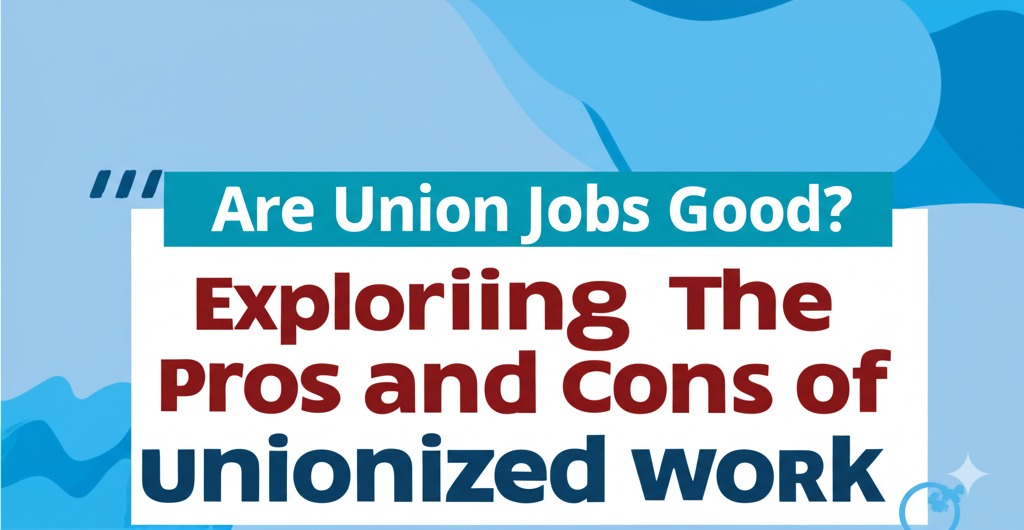
In today’s ever-evolving job market, workers are constantly seeking security, fair pay, and benefits—and that’s where union jobs come into the spotlight. But are union jobs actually good? Or are they a relic of the past?
Whether you’re a recent graduate, a seasoned professional, or someone considering a career switch, understanding the value of union jobs can help you make an informed decision. Let’s dive into what union jobs offer, their potential drawbacks, and whether they’re a good fit for your career goals.
What Is a Union Job?
Before evaluating whether union jobs are good, it’s important to define what they are.
Union jobs are positions in workplaces where employees are represented by a labor union. These unions negotiate with employers on behalf of workers to secure better wages, working conditions, benefits, and more.
Common Industries with Union Jobs
- Education (teachers, support staff)
- Construction and skilled trades
- Public sector (police, firefighters, postal workers)
- Transportation (airline workers, transit workers)
- Healthcare (nurses, hospital staff)
The Benefits of Union Jobs
Union jobs come with a range of advantages that can make them attractive to many workers.
1. Higher Wages
One of the most cited benefits is better pay. According to data from the U.S. Bureau of Labor Statistics, union workers earn about 10–30% more than their non-union counterparts in similar roles.
Why? Unions collectively bargain for wage increases and salary protections, giving workers more leverage.
2. Strong Job Security
Union contracts often include strict guidelines for layoffs, disciplinary actions, and terminations, reducing the risk of arbitrary firing.
For employees, this means greater peace of mind and stability.
3. Comprehensive Benefits
Union members typically receive better health insurance, retirement plans, paid leave, and other perks compared to non-union workers.
4. Workplace Protections
Unions advocate for:
- Safe working conditions
- Fair scheduling
- Protection from discrimination or harassment
Having a union rep can make it easier to voice concerns without fear of retaliation.
The Downsides of Union Jobs
While union jobs have plenty of advantages, they’re not perfect for everyone.
1. Union Dues
Most union jobs require members to pay monthly or annual dues, which fund union operations and legal representation. While many see this as a worthwhile investment, others see it as an added expense.
2. Less Flexibility
Some union contracts can be rigid, limiting the employer’s and employee’s ability to negotiate individualized agreements or promotions outside the union structure.
3. Strikes and Work Stoppages
In rare cases, unionized workers may be called to strike, which can temporarily halt earnings.
4. Seniority Over Merit
In some union environments, promotions or job opportunities may prioritize seniority over performance, which can be frustrating for high-achieving employees.
Are Union Jobs Still Relevant Today?
Yes—and arguably more than ever. In recent years, there’s been a noticeable resurgence in labor organizing across the U.S. and other countries. From Amazon warehouse workers to Starbucks baristas, employees are banding together to demand better conditions.
Reasons for the renewed interest in unions:
- Rising income inequality
- Burnout from demanding jobs
- Inadequate healthcare or benefits
- Lack of protection during crises (e.g., COVID-19 pandemic)
Unions are evolving, too—becoming more inclusive, tech-savvy, and responsive to modern workplace challenges.
How to Find a Union Job
If you’re interested in the benefits of unionized work, here’s how to get started:
1. Target Union-Supported Industries
Jobs in government, construction, education, and healthcare are more likely to be unionized.
2. Use Job Boards and Union Websites
Look for job listings on:
- UnionJobs.com
- State and federal job boards
- Industry-specific union websites
3. Ask During the Hiring Process
Not all employers advertise their union affiliation up front. Don’t be afraid to ask:
“Is this position covered by a union contract?”
So, Are Union Jobs Good?
In most cases, yes. Union jobs offer significant advantages in wages, benefits, protections, and stability. They empower workers to have a collective voice and fight for fair treatment. However, they may not suit everyone—especially those seeking maximum flexibility or rapid career advancement based solely on merit.
Ultimately, whether a union job is “good” depends on your personal values, career goals, and lifestyle preferences.
Final Thoughts
If you’re seeking a more secure, well-compensated job with strong support, a union role might be a great fit. But like any job decision, it’s important to weigh the pros and cons carefully.

Andre Cuevas provides career insights, job search strategies, and professional advice to help individuals navigate the job market and achieve their career goals.






